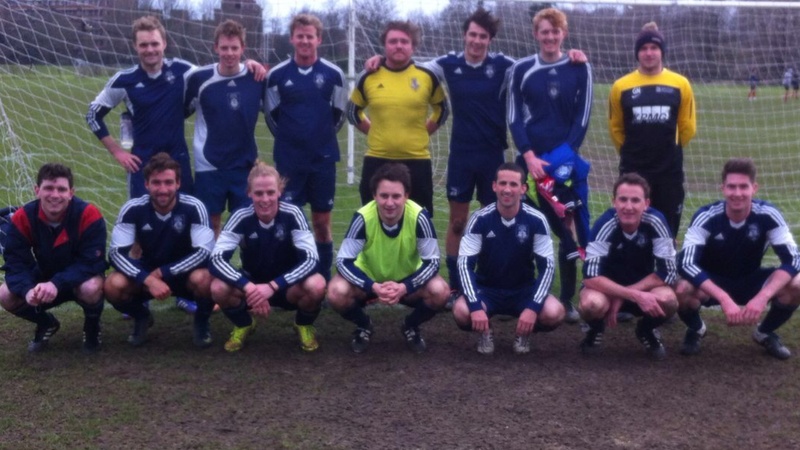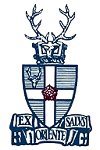

- February 27th 2016, Barn Elms Playing Fields, 12pm
- Division 3
- Referee: Peter Hartley
- Weather: Cloudy
- Pitch: Poor
| No. | Starting XI | Goals | Yellow & Red Cards | Subs On/Off |
|---|---|---|---|---|
| 1 | Charles McHardy | |||
| 2 | Edmund Massey |
70' |
||
| 3 | Will Orr-Ewing | |||
| 4 | Phil Berry | |||
| 5 | Rollo Hovey |
70' |
||
| 6 | Geoff Taunton-Collins (c) |
70' |
||
| 7 | George Pratt | |||
| 8 | Giles Newton |
70' |
||
| 9 | Hugo Trower | 28' |
80' |
|
| 10 | Alex Breeden | 44' | ||
| 11 | Max Curry |
65' |
||
| Substitutes | ||||
| 12 | Jamie Barwick |
45' |
||
| 13 | George Sanders |
40' |
||
| 14 | Doug Pratt |
30' |
So to Barn Elms, for a second meeting between the Old Eastbournians and Harrovians in as many fortnights. A comprehensive cup defeat the previous weekend notwithstanding, team morale was high. The walls of Dressing Room 8 abounded with a pre-match chatter which covered all manner of tangents: a renewed optimism for a season’s course recently-corrected; a competitive league formbook; and several fragmented recollections of the squad’s respective Mare Moto's misadventures the preceding Saturday night.
After a quick warm-up hamstrung by some late arrivals (‘I’m sorry I’m late – I sort of set off late’) the skipper issued instruction to a team boosted on twin fronts: The 11th-hour additions of two OH footballing connoisseurs (Alex Breeden and Hugo Trower) brought to the team a wealth of Arthurian League acumen and a surplus of goals; a trio of debutants, of varying fresh-face and form, in Jamie Barwick, George Sanders, and Doug Pratt, offered a tantalising glimpse of the club future.
Taunton-Collins, as he had done throughout the week, reminded his squad of the wearying state and cramped nature of the pitch, pointed astutely at the wind tearing its way bleakly across the frigid Barn Elms landscape, and lamented once more the necessity, in such conditions, to leave firmly in the locker room the last of any aesthetic sentiment. Elaborate intricacy, he noted, would not be the key with which this door to a third league win in four games would be unlocked (I’m paraphrasing).
The match began as expected, the pitch’s uneven surface ensuring constant, fluctuating changes in possession. With the wind in their faces, the newly-familiar back five, boosted by the classy Rollo Hovey’s inclusion at left-back, began to evince once again a pride in tactical rigidity – the cornerstone of 2016’s success. With Will Orr-Ewing marshalling the defensive line with characteristic, sympathetic authority, aided by a standout performance from Phil Berry at centre half, Harrow grew into the game – all this under the watchful (and eagle-eyed) gaze of our somewhat unwieldy referee.
Not long into the match Max Curry, spearheading the 2’s attacking line, turned his man and was all at once cut down when through on goal. The long-distance judgment call came from the referee – a disinterested shake of the head - despair now writ large across Curry’s face. The game meandered on.
It’s difficult to recount in overly-finite detail (much as I would like to) specific moments - all would-be highlights subscribing to a similar template: A pass to feet cruelly-deviated in its course by an unrelentingly inconsistent surface; a reactionary exhibition of imperfect close-control by the recipient; an anguished cry to the footballing gods for the muddy purgatory on which we found ourselves.
Hugo Trower was offering the game its most dangerous moments (literally and metaphorically), twice troubling his right back with some skilful skirmishes down the left wing, and then flying feet-first into the opposition keeper for good measure. For all of his endeavour, and Giles Newton’s combative enforcing in midfield, game-breaking chances appeared scattered, few and far between. With the wind at his back the opposing keeping kept the Harrovian defence honest with an excess of long kicks - dealt with, for the most part, with relative ease (though with sore heads, as Hovey would later confess).
In an almost identical spot to his first injustice, the referee’s pendulum this time swung in Curry’s favour, wrestled to the ground as he was by his flamboyant French-Canadian counterpart around 30 yards from goal. A beautiful ball in was met by Trower’s expertly-placed glancing header, and a momentary glow descended on the Barn Elms planes. 1-0 up, Harrow very much on top.
The first round of rolling subs limbered up, and Massey made way for Doug Pratt’s club debut. The rest of the half played out in typically gritty fashion. Max Curry took himself off for Sanders after one too many injustices at the hands of his tactile opposing centre-halves, so fearful was he of his own steadily-building rage.
At half time, the skipper encouraged a continuation of the dogged determination that was starting to show forth. Phil Berry’s performance was heralded as the benchmark, the standard to be matched en masse for the remainder of the game. James Barwick, adorned in his finest 3G trainers, came on for Taunton-Collins, tasked with patrolling the left flank.
Not two minutes into the second half, a moment of magic from Breeden took Harrow to the brink of mathematical safety. Receiving the ball with his back to goal, Breeden cut onto his left foot and almost simultaneously let fly from a good 20 yards out. The opposing keeper, an infuriatingly vocal presence throughout the afternoon, was left momentarily (and mercifully) stunned as the ball crashed by him on its way to the right hand corner. 2-0 now the score, and Harrow’s game to lose.
It is easy to select from any one of the early-season defeats this team encountered situations wherein Harrow lost games that were there to win. Even the home Eastbourne fixture, the team’s only lost league points of 2016, saw a 2-0 winning position mutate horribly into a 3-3 draw. Things are different now, and there grows an intangible sense that, under Taunton-Collins’ astute leadership, the team is maturing into an Arthurian mid-league force – no longer a team that surrenders but a team that can readily close out a game. A flashpoint on the far side of the pitch demonstrated this fighting spirit brilliantly – Trower not taking a backward step when a regrettable flare up culminated in a spot of prep-school groping on the part of a wild Eastbournian. Trower got a booking for his troubles.
Not long after Max Curry’s reintroduction, a chance to settle matters presented itself when Curry, through on goal, was once more flattened by his marker. The point to the penalty spot was immediate (the keeper’s reaction maddeningly predictable). Curry stepped up, picked his spot, and promptly guided his penalty straight into the keeper’s waiting arms. 2-0 the score remained, Curry’s rage now cataclysmic.
Barwick was performing well on his flank, combining well with George Pratt in midfield to twice get away down the left hand side and provide welcome relief from the momentum now at Eastbourne’s backs. Fifteen minutes from the guaranteed safety a win would afford, a ball through from the Eastbourne midfield split the Harrow defence, their rangy striker beating McHardy to the ball, and Harrow found their cushion halved. A nervy end to the game lingered, ominously, in the South-West London breeze.
The onslaught came almost inevitably (a draw no more useful to the Eastbournians than a defeat), and McHardy, as he has done so often since the turn of the year, provided a duo of game-saving stoppages. Harrow sat back, content to see out the match, and for once in this season of emotional turbulence, the end came in relatively serene fashion. The whistle blew – Harrow mathematically safe for another season in Division 3.
And so it is, then, with safety assured (Haberdashers’s upcoming fixture with Salopians ensuring that Harrow are now, unequivocally, safe) that we may marvel at a turnaround in form that has led to 10 points out of a possible 12 since the turn of the year, and has rescued a situation wherein teams less of heart may well have panicked.
Given the meander into classical literature in the previous Eastbourne write-up, perhaps another excerpt is appropriate (most probably not) – in so far as it addresses both the heart the team has shown in rescuing a season littered with difficult losses, and, perhaps, finessing the resolve inherent in the makeup of the 2’s newfound footballing DNA:
τέτλαθι δή, κραδίη: καὶ κύντερον ἄλλο ποτ᾽ ἔτλης. Homer, The Odyssey 20.18
(‘Be strong, my heart! You have endured worse things than this.’)

